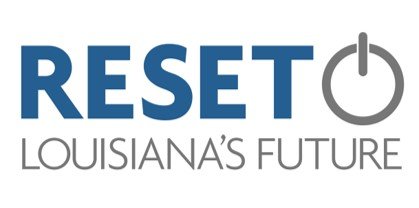By David Jacobs | The Center Square
Three prominent public policy groups in Louisiana are calling for a “reset” of the state’s approach to taxes, spending and other issues.
The Public Affairs Research Council, the Council for a Better Louisiana, and the business-focused Committee of 100 are collaborating on RESET Louisiana’s Future, a nonpartisan effort focused on four main issues: state finances, education, transportation/infrastructure and criminal justice/public safety. Their policy discussion and proposals are available here.
The rollout has been fairly “low-key” so far, said Robert Travis Scott, the Public Affairs Research Council’s president. The summer lull immediately following the end of a legislative session probably isn’t the best time to roll out a major policy initiative to the general public.
But RESET has been speaking to potential candidates for office at meetings around the state.
“We’re not asking them to sign a pledge,” Scott said. “We’re not telling them if they sign up that somebody’s going to give them money.”
Instead, they’re hoping to serve as an educational resource, both before and after the election. And they’re helping them understand longstanding issues that, admittedly, are easier to point out (as numerous other reports have shown) than to change.
“These things have been studied for a long time,” said Council of 100 CEO Michael Olivier.
Case in point: a tax system where the tax rates are relatively high, yet the taxpayer burden is average or relatively low compared to other states thanks to numerous credits and exemptions.
“That is a picture of a broken system,” the RESET paper on taxes argues. “Some taxpayers are exposed to high rates and some are not.”
Tax-related recommendations include:
• Permanently eliminate the 100 sales tax exemptions that currently are suspended.
• Expand the sales tax base, including taxation of some services, and reduce the sales tax rate.
• Implement a more centralized sales tax administration system.
• Eliminate the deduction for federal income taxes paid and lower corresponding state tax rates.
• Allow local jurisdictions to raise property taxes, then decrease state spending to local governments.
Another paper touches on the state’s lengthy, often-amended constitution.
“As the number of constitutional funds and detailed restrictions in the Louisiana Constitution increases, so does the inability of the state and lawmakers to address current and pressing fiscal concerns,” it reads. “It is not surprising that over the last three years, the Legislature has held seven special sessions solely to craft a workable state budget.”
Article VII, which sets the revenue and finance rules for state government, has been amended 99 times, but never to remove a fiscal provision, the paper continues. Instead, new constraints, mostly budget rules or dedicated funds, have been added.
But while a convention to write a new constitution could be held, that’s not the only way to loosen those fiscal constraints. A package of new amendments could be crafted and put before the voters individually, for example.
Or, the legislature could rewrite Article VII and put a new version forward as a single ballot proposal. A fiscal-only convention is a third possibility, though that might be legally dicey since the constitution does not provide for a limited convention.
A convention could allow for more participation from people other than state lawmakers, but there’s no telling where it ends up once it gets started. And the sheer amount of time necessary to hold one makes participation unrealistic for some people, Olivier said, suggesting incremental change over the next couple years might be a better way to go.
About a third of legislators are term-limited, which creates opportunities for potential candidates, he notes. After July 4th, as lawmakers return from vacation, RESET plans to start meeting with incumbents.
And after the election, Olivier said he wants to provide “cover” for candidates who support RESET’s proposed changes, which could include testifying at committee hearings.
“They realize they’re going to have to make some very difficult votes,” he said.
